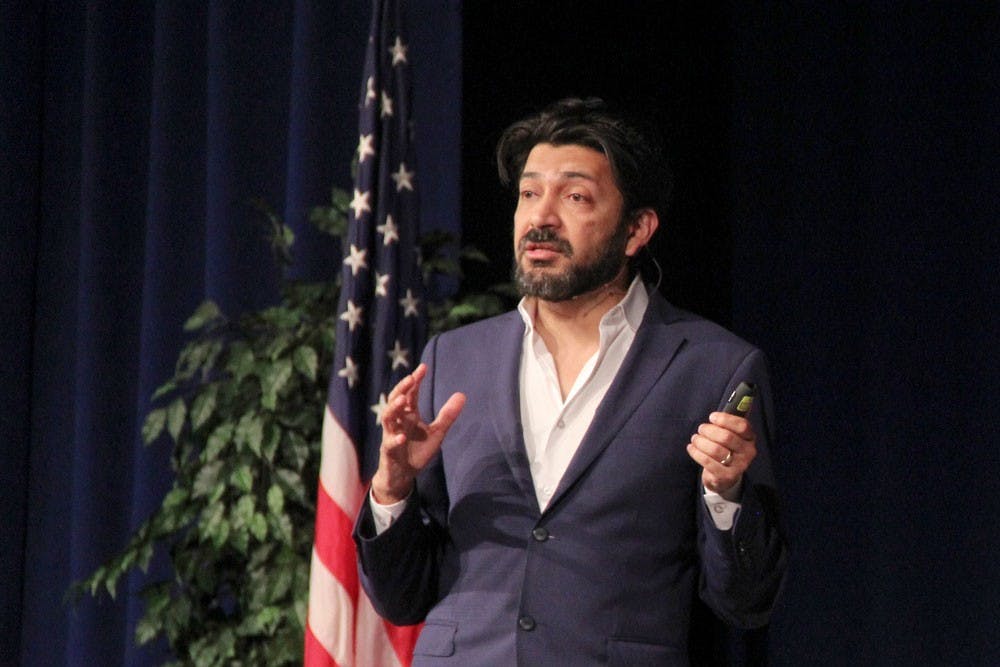Siddhartha Mukherjee began his UB Distinguished Speakers talk by jokingly asking the audience to remember the moment in their childhood that they said they wanted to cure cancer.
“It seems to me that that moment has been lost,” Mukherjee said. “We have to get back to it because cancer is one of the most important problems of our generation.”
Mukherjee spoke at Alumni Arena as part of UB’s 29th annual Distinguished Speakers Series Wednesday night. Mukherjee, a Pulitzer Prize-winning author, cancer physician and researcher, discussed the different theories and history of cancer. He named his talk “The New Landscape of Cancer.”
When Mukherjee was a child, he aspired to be astronomer Carl Sagan. Mukherjee was fascinated with the universe, which made him wonder about the “inner cosmos, inner galaxies, [and] inner stars.”
“That’s when I really morphed from wanting to be a rocket scientist to being a biologist,” Mukherjee said.
He defined cancer as a disease of cells, genes, genomes and genetic pathways.
“Genes don’t interact with each other in isolation, but in fact they interact with each other just like language happens. Words are not placed in isolation,” Mukherjee said. “These words string together meaning. And so we have to understand what sentences cancer is speaking.”
Mukherjee said the topic of cancer has become difficult to understand, but he said once people understand the “language” of cancer, they’ll be one step closer to solving it.
“It is the disease of the aging but not a disease of the agent,” Mukherjee said.
He said the human genome is the entire set of about 21,000 to 25,000 genes. It is the “encyclopedia” of all genes.
Mukherjee spoke about the theories that “captivated the ancient world.”
“As human beings, we’re theory-making apes, it’s one of the most beautiful qualities that we have,” Mukherjee said.
Mukherjee said there are growth-controlling genes in every cell. Every dividing cell has the capacity to regulate itself. Every time a cell divides the cell is like a “copy machine,” it could make a mistake like any machine could too.
A cell has to undergo several steps and mutations to become cancerous, according to Mukherjee. Mukherjee calls this “slouching toward mortality.”
He said the defining problem of our generation and future generations is what happens when targeted therapies fail. He asked the audience questions of how to counter the costs, how to handle resistance and how to deal with maintenance of cancer.
Some UB students in attendance resonated with Mukherjee’s speech.
“Cancer is such a terrible thing in our world yet it is something that touches everyone,” said Jordan Einhorn, a sophomore political science major. “Most people are affected by cancer in some way. It’s one of those things where the more you learn about it, the more you realize how much you don’t know and how much more there is to know and so I thought coming to this talk would be good for me.”
Mukherjee’s new book The Gene: An Intimate History will be released May 17.
When asked what advice he has for families suffering through cancer, Mukherjee said he doesn’t ask people to be positive but maintain a sense of support and equanimity. He said conversations and decisions with loved ones can be “extremely hard.”
Mukherjee sees patients two days a week.
“Every day I tell myself I’m in the most fortunate profession,” Mukherjee said. “I get to think in a new way everyday and that is unbelievably motivating for me.”
Every day Mukherjee works on his book, he rewards himself with a Klondike ice cream bar.
“When you’re doing very, very creative work, don’t forget to reward yourself for it because no one else will for a while,” Mukherjee said.
The next distinguished speaker that will be a part of the series is Kevin Spacey, an Academy award-winning actor and star of Netflix’s “House of Cards.” Spacey will speak in Alumni Arena on April 27.
Hannah Stein is the assistant news editor and can be reached at hannah.stein@ubspectrum.com





